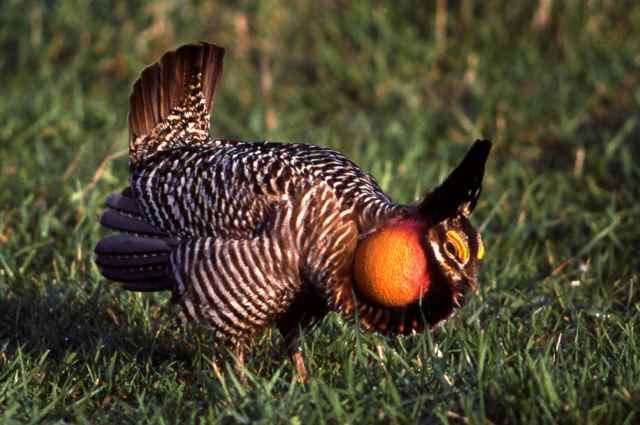Utah Fish Report
Fish Report for 10-28-2013
Fish Report for 10-28-2013
Five-state plan to protect lesser prairie chicken endorsed by the US Fish and Wildlife Service

by New Mexico Game & Fish Department
10-28-2013
888-248-6866
Website
SANTA FE -The U.S. Fish and Wildlife Service endorsed Wednesday a landmark conservation plan by New Mexico and four other states for the lesser prairie chicken, a species proposed for listing under the Endangered Species Act (ESA).
"This is a landmark decision for long-term conservation of the bird," New Mexico Department of Game and Fish Director Jim Lane said. "I applaud Director Dan Ashe for his endorsement of the range-wide conservation plan. The states now will move into implementation in a sincere effort to provide incentives to landowners for conservation and ultimately preclude a listing under the Endangered Species Act."
The Western Association of Fish and Wildlife Agencies plan represents an unprecedented conservation effort among the states within the bird's historical range, the U.S. Fish and Wildlife Service, private landowners and industry partners. Texas, New Mexico, Oklahoma, Kansas and Colorado drafted the plan to include financial incentives for landowners who voluntarily manage their lands to benefit the species. The plan also provides a framework to mitigate the effects of activities, such as energy development, throughout the bird's range.
Under the plan, long-term agreements with farmers, ranchers, energy development companies, utilities, electric cooperatives, and other stakeholders will aim to improve habitat conditions for the lesser prairie-chicken and increase their populations.
"This plan is a voluntary one and its success depends upon our ability to engage landowners, businesses, local communities and governments, and other affected stakeholders across its range," said Carter Smith, Western Association of Fish and Wildlife Agencies president and Texas Parks and Wildlife Department executive director. "Some may perceive that as a weakness, but in this case we absolutely believe it to be a strength and that the carrot will attract many more conservation participants than a stick."
The U.S. Fish and Wildlife Service will consider the plan, and its implementation and effectiveness when it makes a final determination on whether to list the lesser prairie chicken under the Endangered Species Act in March 2014.
The lesser prairie chicken is an iconic grassland species that is a key indicator of the health of the southern Great Plains and grasslands across the central United States as a whole. The species' historical range has decreased by an estimated 84 percent. The decrease is primarily a result of habitat fragmentation and loss caused by development and conversion to other uses. Due to drought conditions in the West, the total prairie chicken population declined by an estimated 50 percent in 2012, which is indicative of the population booms or busts associated with long-term regional weather patterns.
"We are encouraged to see U.S. Fish and Wildlife Service endorsement of the five-state, range-wide plan," Smith said. "Years of due diligence have gone into this plan, guided by scientific research and monitoring, and developed with input from landowners, agriculture, wind and oil and gas interests and other stakeholders. We can now work at the local level to implement the plan."
Founded in 1922, the Western Association of Fish and Wildlife Agencies consists of 23 member states and provinces that have primary responsibility and authority for protecting and managing fish and wildlife in the western United States and Canada. The organization promotes the principles of sound resource management, as well as strengthening partnerships and cooperation among local, state and federal agencies, non-government conservation organizations and private industry. To learn more about the organization, and to find a copy of the Lesser Prairie Chicken Range-wide Conservation Plan, please visit www.wafwa.org.
"This is a landmark decision for long-term conservation of the bird," New Mexico Department of Game and Fish Director Jim Lane said. "I applaud Director Dan Ashe for his endorsement of the range-wide conservation plan. The states now will move into implementation in a sincere effort to provide incentives to landowners for conservation and ultimately preclude a listing under the Endangered Species Act."
The Western Association of Fish and Wildlife Agencies plan represents an unprecedented conservation effort among the states within the bird's historical range, the U.S. Fish and Wildlife Service, private landowners and industry partners. Texas, New Mexico, Oklahoma, Kansas and Colorado drafted the plan to include financial incentives for landowners who voluntarily manage their lands to benefit the species. The plan also provides a framework to mitigate the effects of activities, such as energy development, throughout the bird's range.
Under the plan, long-term agreements with farmers, ranchers, energy development companies, utilities, electric cooperatives, and other stakeholders will aim to improve habitat conditions for the lesser prairie-chicken and increase their populations.
"This plan is a voluntary one and its success depends upon our ability to engage landowners, businesses, local communities and governments, and other affected stakeholders across its range," said Carter Smith, Western Association of Fish and Wildlife Agencies president and Texas Parks and Wildlife Department executive director. "Some may perceive that as a weakness, but in this case we absolutely believe it to be a strength and that the carrot will attract many more conservation participants than a stick."
The U.S. Fish and Wildlife Service will consider the plan, and its implementation and effectiveness when it makes a final determination on whether to list the lesser prairie chicken under the Endangered Species Act in March 2014.
The lesser prairie chicken is an iconic grassland species that is a key indicator of the health of the southern Great Plains and grasslands across the central United States as a whole. The species' historical range has decreased by an estimated 84 percent. The decrease is primarily a result of habitat fragmentation and loss caused by development and conversion to other uses. Due to drought conditions in the West, the total prairie chicken population declined by an estimated 50 percent in 2012, which is indicative of the population booms or busts associated with long-term regional weather patterns.
"We are encouraged to see U.S. Fish and Wildlife Service endorsement of the five-state, range-wide plan," Smith said. "Years of due diligence have gone into this plan, guided by scientific research and monitoring, and developed with input from landowners, agriculture, wind and oil and gas interests and other stakeholders. We can now work at the local level to implement the plan."
Founded in 1922, the Western Association of Fish and Wildlife Agencies consists of 23 member states and provinces that have primary responsibility and authority for protecting and managing fish and wildlife in the western United States and Canada. The organization promotes the principles of sound resource management, as well as strengthening partnerships and cooperation among local, state and federal agencies, non-government conservation organizations and private industry. To learn more about the organization, and to find a copy of the Lesser Prairie Chicken Range-wide Conservation Plan, please visit www.wafwa.org.
More Reports
NEW MEXICO DEPARTMENT OF GAME AND FISH PROTECTS WATERWAYS FROM ZEBRA & QUAGGA MUSSELS

10-28-2013
SANTA FE - The New Mexico Department of Game and Fish has stepped up its efforts to keep zebra and...... Read More
New Mexico Game & Fish Department Reports
for Thursday, October 24th, 2013Santa Fe River: Fishing bag limits, tackle restrictions lifted on Santa Fe River

www.UtahFishReports.com © 2026. All Rights Reserved.
Website Hosting and Design provided by TECK.net
Website Hosting and Design provided by TECK.net